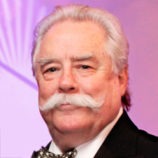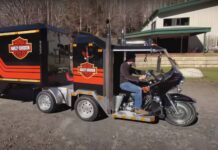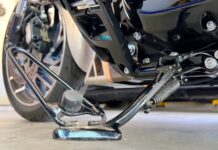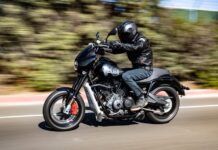A German automobile manufacturer just purchased an Italian motorcycle manufacturer. Audi bought Ducati. It looks like they paid 860 million Euros and picked up 200 million in Ducati debt, but neither participant is talking.
The German VW group controls Audi, Seat, Skoda, Bentley, Bugatti, MAN, Scania and Lamborghini, and is trying to absorb Porsche. Not bad for a company that made its bones building Love Bugs.
From 1969 to 1981 American Machine and Foundry (AMF) owned, among other things, Roadmaster Bicycles, Head Skis, Ben Hogan Golf Clubs, Voit sporting goods, AMF Bowling Equipment, snowmobiles, lawn and garden equipment, exercycles, sailboats, scuba gear, dozens of other companies and… oh yes… Harley-Davidson motorcycles.
At one time Beatrice Foods owned over 100 companies, making everything from Airstream and Altoids to Krispy Kreme, Playtex, Peter Pan and Samsonite.
Rupert Murdoch owns every newspaper on the face of the planet except The National Poetry Review and the Communist Party’s The Daily Worker. And I am not so sure about The Daily Worker.
It is all big business.
To listen to the motorcycle press, Audi buying Ducati is a great idea. Who knows? If Audi can keep their hands off Ducati, maybe it is. But history shows that’s not likely. Cost accountants read profit sheets, and everything that doesn’t make a 10-percent profit gets the ax.
AMF buying Harley-Davidson was also thought to be a great idea. AMF found out that building and selling motorcycle was different than blowing up volleyballs and they couldn’t make money on Harley. They ran the business poorly, nearly ruining its name forever and eventually sold it back to Harley administrators.
Beatrice Foods controlling 100 companies was the best thing for the stock exchange and the price of their shares went up. But Beatrice Foods was leveraged out of business by Kohlberg Kravis Roberts. In the next few years her assets were sold off, and in 1990 what remained was sold to ConAgra Foods.
“Grow or die” was the motto for Beatrice and the mantra for big business. They were wrong. But Harley believed it and decided that they would copy the formula. They bought the controlling interest in Buell and in 2008 Harley-Davidson bought MV Agusta for $109 million dollars. The market went south, forcing them to eliminate Buell and, after only two years, sell off MV Agusta, taking a huge loss.
Rupert Murdoch is saving dozens of newspapers that would be going out of business. Is there a problem here? Not if you want all your news synthesized through a Rupert filter. Not if you want all of the news to come from the same place with the same bias.
Is it mandatory that everything be built by huge conglomerates? Is the individual businessman or the individual manufacturer redundant? Can widgets only be made by a company with a bloated administration and a huge ego?
In doing some research on a project I am writing about World War II, I have found some incredible facts about American defense plants and how well they operated. One B-24 bomber was made, in its entirety, in just over an hour. Two P-51 Mustangs could be built in an hour. Three hundred Mitchell bombers were built in a month and the workers had the weekends off. Between June, 1942, and August, 1942, 10 weeks’ time, one million .45 caliber pistols called “The Liberator” were built. That is one every 6.6 seconds; less time to make them than it took to load them. Today, if you wanted to build “The Liberator,” you couldn’t get the paperwork out of congressional committee or approved by OSHA and the EPA in 10 years, let alone 10 weeks.
The United States Olympic Team’s uniforms were made in China. Ralph Lauren, who designed them, said it never occurred to him not to send them to China.
Los Angeles Mayor Antonio Villaraigosa has started a campaign to boost the clothing business in L.A.; “Made in L.A.” He claims that the City of Los Angeles can produce apparel from design to manufacture, from patterns to hangers, more quickly and more cheaply than sending it to China. Ralph ought to have a talk with Villaraigosa.
Walmart is huge, wants to kill the little guy and take over the world. They sell underwear from Honduras. There is nothing wrong with buying your tighty white briefs at Walmart except, maybe, just maybe, you want to buy your silk boxers at a fine men’s haberdashery, if you can find a men’s haberdashery.
It is a blatant presumption to assume this is the only way to do business, because it hasn’t always been like that.
Yeah, yeah, I know; we live in a global market, it takes a village and all that other crap. However, I am concerned about the individual building something. Look at the businesses in your town. Are they building something or are they services industries? Where I live there is hardly anyone making anything. Everyone is washing each other’s cars, manicuring each other’s fingernails, frying each other hamburgers, mowing our lawns and grooming our dogs. Can an economy exist by doing nothing more than trading services? I wonder. I also wonder about the long-term health of an economy that thinks it can take individual companies, tie them together into a multinational conglomerate and then profit by divesting the assets. That is not manufacturing or building a strong financial system—that is greed.
OK; so what? I have nothing against Audi, or Rupert Murdock, or Walmart. Maybe globalization is a great thing. But knowing what the U.S.A. defense plants turned out in World War II makes a good case for getting out of the way of the American worker and letting him produce. If you did, no one could compete with him.
In World War II there was leadership and a single focus. Don’t tell me we can’t make things happen when we have focus.
What sort of focus do we have now? The only focus elected officials have today is on the opposition party, not on a healthy economy. That is not leadership.
I hold both parties equally responsible. So like Mercutio, as he turns to both the Montagues and the Capulets, I say, “A plague on both your houses,” and bid good luck to Audi with Ducati.



















